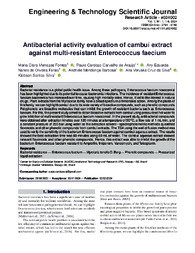Embrapa Tabuleiros Costeiros
 Publicações
Publicações
Antibacterial activity evaluation of cambuí extract against multi-resistant Enterococcus faecium.
Autoria: FONTES, M. C. M.; ARAUJO, P. C. C. de; FARIAS, A. E. N. de O.; BARBOSA, A. M.; SILVA, A. V. C. da; SILVA, K. S.
Resumo: Bacterial resistance is a global public health issue. Among these pathogens, Enterococcus faecium nosocomial has been highlighted due to its potential to cause bacteremia infections. The incidence of resistant Enterococcus faecium bacteremia has increased over time, causing high mortality rates. Hence, it led to the interest in natural drugs. Plant extracts from the Myrtaceae family have a broad-spectrum antimicrobial action. Among the plants of this family, we can highlight cambu´? due to its wide variety of bioactive compounds, such as phenolic compounds. Polyphenols are bioactive molecules that can inhibit the growth of resistant bacteria such as Enterococcus faecium. For this, the present study aimed to obtain bioactive extracts from cambu´? using pressurized hot water to grow inhibition of multiresistant Enterococcus faecium nosocomial. In the present study, antibacterial compounds were obtained after extraction kinetics over 120 minutes at a temperature of 50 ºC, a flow rate of 1 mL/min, and a constant pressure of 200 bar using water as the extraction solvent—spectrophotometric methods quantified flavonoids and other phenolic compounds from cambu´? extracts. The TSA using the well-diffusion method was used to verify the sensitivity of the bacterium Enterococcus faecium against cambu´? aqueous extract. The results showed the best extraction time was 60 minutes using 60 mL of water. The cambu´? aqueous extract showed relevant flavonoids and other phenolic compounds. Hence, this extract was able to inhibit the growth of the bacterium Enterococcus faecium resistant to Ampicillin, Imipenem, Vancomycin, and Teicoplanin.
Ano de publicação: 2024
Tipo de publicação: Artigo de periódico
Unidade: Embrapa Tabuleiros Costeiros
Palavras-chave: Bacterial diseases of plants, Cambui
